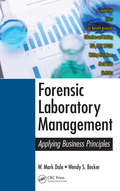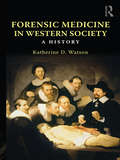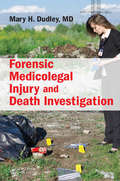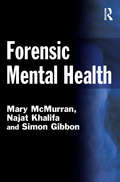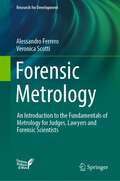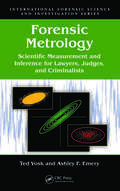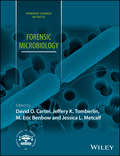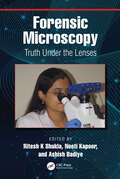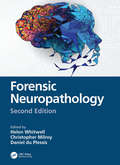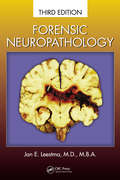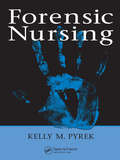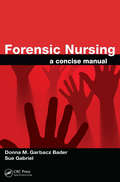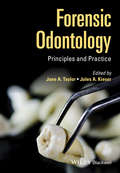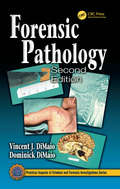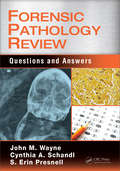- Table View
- List View
Forensic Laboratory Management: Applying Business Principles
by W. Mark Dale Wendy S. BeckerNew technologies, including DNA and digital databases that can compare known and questioned exemplars, have transformed forensic science and greatly impacted the investigative process. They have also made the work more complicated. Obtaining proper resources to provide quality and timely forensic services is frequently a challenge for forensic managers, who are often promoted from casework duties and must now learn a whole new set of leadership skills.The interdisciplinary and scientific nature of laboratories requires strong leadership ability to manage complex issues, often in adversarial settings. Forensic Laboratory Management: Applying Business Principles provides laboratory managers with business tools that apply the best science to the best evidence in a manner that increases the efficiency and effectiveness of their management decision making. The authors present a performance model with seven recommendations to implement, illustrating how forensic managers can serve as leaders and strategically improve the operation and management in scientific laboratories.Topics include: Key business metrics and cost–benefit analyses Ethical lapses: why they occur, possible motives, and how problems can be prevented Forensic training, education, and institutes ISO/IEC 17025 accreditation implementation The book includes case studies simulating a working laboratory in which readers can apply business tools with actual data reinforcing discussion concepts. Each chapter also includes a brief review of current literature of the best management theories and practice.The downloadable resources supply two mock trial transcripts and associated case files along with PowerPoint® slides from Dr. George Carmody’s workshop on Forensic DNA Statistics and Dr. Doug Lucas’s presentation on ethics.
Forensic Law Casebook: Judicial Reasoning and the Application of Forensic Science in Criminal Cases
by Charles P. NemethWhile there are several texts that focus on forensic science techniques and applications, there are few to no quality books that adequately address the judicial interpretation of forensic legal and scientific principles. The field of forensic science and law has long been in need of a historic casebook. Forensic Law Casebook: Judicial Reasoning and the Application of Forensic Science in Criminal Cases fills the current void by reviewing actual case law and translating the practical application of science to the courtroom. Each chapter represents a unique forensic discipline, providing a short introduction to the subject matter, the relevant case law and court cases that pertain to that subject area and posing a variety of questions and issues to the student. All cases provided contain a sufficient portion of the legal decision - and its implications to the evidence and analytical practices of that discipline - in order to then pose critical and analytical questions to the student, once they have fully read the case material and the decision and considered its implications. Each chapter ends its theoretical examination with real-world experience encountered by those laboring in the investigative and collection processes - as well as problems or challenges encountered by those employed in the office of the prosecutor, public defender, medical examiner or other aligned office. This last section of each chapter gives true meaning and impact as to how forensic law decision-making impacts forensic practitioners, and a true understanding of the responsibility placed on law enforcement, investigators and scientists tasked with collecting, preserving and analyzing the evidence. Forensic Law Casebook provides the reader with an array of legal cases and decisions that lay out the parameters of forensic law and its evidentiary value. In the end, what emerges from this are the bedrock principles that guide current forensic evidence and the admissibility of various practices common to the field applications of forensic science. Practitioners, law students, undergraduate and graduate students in compatible majors - as well as law and university libraries - will benefit from this essential reference and adjunct to anyone studying forensic science, criminalistics and the law.
Forensic Linguistics: Advances in Forensic Stylistics
by Gerald R. McMenaminTed Kaczynski's manifesto.The ransom note for Jon Ben Ramsey.The anthrax letters threatening our government and media agencies.With the aid of forensic linguistics, the words criminals leave behind in their unsigned letters can be as distinctive as a signature or voice. Although the linguistic study of language is well established,
Forensic Materials Engineering: Case Studies
by Colin Gagg Peter Rhys Lewis Ken Reynolds Colin GaggMost books on forensic engineering focus on civil engineering failures rather than consumer or general mechanical products. Unique both in scope and style, this treatment is built upon case studies of real accidents, broadly focused on consumer products, and dedicated to problem solving through scientific principles. Each well-illustrated case stud
Forensic Medical Investigation of Motor Vehicle Incidents
by Michael P. BurkeForensic Medical Investigation of Motor Vehicle Incidents provides an in-depth study of the circumstances underlying motor vehicle incidents and allows for a reasoned analysis of a crash victim's injuries. It also gives law enforcement the tools to communicate relevant information to the forensic pathologists and trains pathologists to infer crucia
Forensic Medicine
by Reinhard B. Dettmeyer Marcel A. Verhoff Harald F. SchützThis book presents the latest developments in the field of forensic pathology/forensic medicine, including important advances in forensic histopathology, forensic radiology, medical malpractice, understanding of child abuse, and forensic toxicology. Various forms of trauma are addressed in individual chapters, and among the other topics covered are traffic medicine, forensic alcohol toxicology, forensic DNA analysis, forensic osteology, and international regulations. The book includes a wealth of color illustrations and numerous tables presenting key facts. The authors are leading experts in general pathology, forensic radiology, and forensic toxicology. Forensic Pathology/Forensic Medicine: Fundamentals and Perspectives will be of interest not only to specialist pathologists and those working in forensic medicine, but also to coroners, forensic physicians, students, lawyers, attorneys, and policemen.
Forensic Medicine and Human Cell Research: New Perspective And Bioethics (Current Human Cell Research And Applications Ser.)
by Takaki IshikawaThis volume reviews the application of biochemical and molecular pathologies, which are based on conventional pathomorphology, toxicology, and DNA analysis technologies, not only to autopsies but also to the field of clinical medicine in general. The systematic and integrated use of biochemical, immmunohistochemical, and molecular pathology, toxicology, DNA analysis, and cell culture investigations reinforces the pathophysiological diagnostic criteria in a forensic autopsy for clinical diagnosis. The use of these technologies can help to determine the cause and process of death and characterize the functional pathophysiological changes in the body that occur during the death process. Recently, the systematization of the latest supplemental tests, diagnostic methods, and quality control has allowed us to conduct comprehensive data collection and analysis for a range of diseases. This book presents the latest findings on the pathology of a broad range of human diseases, based on data concerning postmortem biochemistry and molecular biology collected from approximately 1000 people. Further, it puts forward a code of ethics for undertaking pathophysiological research and describes research techniques for uncovering pathophysiological mechanisms. As such, it offers a unique resource for researchers in the field of forensic medicine and pathology, and for clinicians.
Forensic Medicine in Western Society: A History
by Katherine D. WatsonThe first book of its kind, Forensic Medicine in Western Society: A History draws on the most recent developments in the historiography, to provide an overview of the history of forensic medicine in the West from the medieval period to the present day. Taking an international, comparative perspective on the changing nature of the relationship between medicine, law and society, it examines the growth of medico-legal ideas, institutions and practices in Britain, Europe (principally France, Italy and Germany) and the United States. Following a thematic structure within a broad chronological framework, the book focuses on practitioners, the development of notions of ‘expertise’ and the rise of the expert, the main areas of the criminal law to which forensic medicine contributed, medical attitudes towards the victims and perpetrators of crime, and the wider influences such attitudes had. It thus develops an understanding of how medicine has played an active part in shaping legal, political and social change. Including case studies which provide a narrative context to tie forensic medicine to the societies in which it was practiced, and a further reading section at the end of each chapter, Katherine D. Watson creates a vivid portrait of a topic of relevance to social historians and students of the history of medicine, law and crime.
Forensic Medicolegal Injury and Death Investigation
by Mary H. Dudley, M.D.Introducing the basic concepts of clinical forensic medicine and death investigation, this book covers the main areas of forensic investigation . It provides an introduction to forensic science and coverage of injury patterns, natural disease, accidental trauma, child injury and fatalities, and domestic violence. Anyone who has direct contact with death, crime, and the medicolegal system, including nurses, physicians, attorneys, death investigators, forensic pathologists, and police detectives, will find this an invaluable reference.
Forensic Mental Health (Criminal Justice Series)
by Mary McMurran Najat Khalifa Simon GibbonThis book provides a concise introduction to the increasingly important field of forensic mental health. It aims to set out both the key concepts in forensic mental health as well as the way the discipline operates in the broader context of criminal justice and mental health care systems. It will provide an ideal introduction to the subject for students taking courses in universities and elsewhere, for mental health practitioners in the early stages of their careers, and for professionals from other agencies needing an informed and up-to-date account of forensic mental health.
Forensic Mental Health Assessment in Criminal Contexts: Key Concepts and Cases
by Noah K Kaufman Shane S Bush Nicole R. Schneider Scotia J. HicksThis valuable compendium advances the understanding of mental health case law, making it highly accessible to practicing forensic professionals. Divided into two parts, the first section focuses on explaining important topics related to forensic psychological and forensic neuropsychological assessment, while the second section stands on its own as a collection of fascinating legal cases with high relevance to mental health and legal professionals interested in how mental health disorders impact criminal behavior among juveniles and adults. The book begins with an accessible primer on abnormal behavior, exploring the links between criminal behavior and mental health disorders. It goes on to thoroughly describe what goes into forensic psychological and forensic neuropsychological evaluations, including discussion about the Federal Rules of Evidence, as they pertain to evidence-generation during the mental health evaluation process. The book also focuses on psychometric concepts, including reliability, validity, sensitivity, and specificity, as well as an exploration of ‘science’ and ‘the law’ which includes a discussion about the difference between science and pseudoscience, the different sources of law (constitutions, statutes, and case law), and how the intellectually competitive practice of law is similar to the enterprise of science. Ethical issues faced by the forensic mental health worker are also addressed. The second section of the book, Legal Cases for the Forensic Mental Health Professional, is an alphabetical summary of important and interesting legal cases with relevance for mental health professionals. These cases offer real-world significance while summarizing complex legal decisions through a neuropsychological sieve, to allow both legal and psychological communities to better understand each other’s professions. This book will be an invaluable resource for forensic psychologists, forensic neuropsychologists, forensic psychiatrists, and other mental health professionals whose work brings them into contact with the juvenile justice and adult criminal justice system. It will also be of interest to legal professionals, criminal justice departments, and law schools.
Forensic Metrology: An Introduction to the Fundamentals of Metrology for Judges, Lawyers and Forensic Scientists (Research for Development)
by Alessandro Ferrero Veronica ScottiThis book offers up-to-date information and guidance on the application of metrology in legal proceedings, clarifying the limits of validity of scientific evidence and presenting an illuminating series of case studies in which measurement uncertainty has played an important role. The fundamental concepts of metrology are discussed, and it is explained how metrology is capable of quantifying the reliability of measurement results and thereby contributing to appropriate decision making. With the aid of the presented case studies, this book will assist readers in understanding how legal decisions should be made in the presence of uncertainty. Areas covered in those studies include breath alcohol concentration analysis, and DNA profiling. Nowadays, decisions in most legal cases are based on evidence obtained through scientific analysis involving the acquisition of accurate measurements. Against this background, Forensic Metrology will be of value for lawyers and judges in both civil and common law countries, as well as engineers and other scientists with an interest in the subject.
Forensic Metrology: Scientific Measurement and Inference for Lawyers, Judges, and Criminalists (International Forensic Science and Investigation)
by Ted Vosk Ashley F. EmeryForensic metrology is the application of scientific measurement to the investigation and prosecution of crime. Forensic measurements are relied upon to determine breath and blood alcohol and drug concentrations, weigh seized drugs, perform accident reconstruction, and for many other applications. Forensic metrology provides a basic framework for th
Forensic Microbiology (Forensic Science in Focus)
by David O. Carter M. Eric Benbow Jeffery K. Tomberlin Jessica L. MetcalfForensic Microbiology focuses on newly emerging areas of microbiology relevant to medicolegal and criminal investigations: postmortem changes, establishing cause of death, estimating postmortem interval, and trace evidence analysis. Recent developments in sequencing technology allow researchers, and potentially practitioners, to examine microbial communities at unprecedented resolution and in multidisciplinary contexts. This detailed study of microbes facilitates the development of new forensic tools that use the structure and function of microbial communities as physical evidence. Chapters cover: Experiment design Data analysis Sample preservation The influence of microbes on results from autopsy, toxicology, and histology Decomposition ecology Trace evidence This diverse, rapidly evolving field of study has the potential to provide high quality microbial evidence which can be replicated across laboratories, providing spatial and temporal evidence which could be crucial in a broad range of investigative contexts. This book is intended as a resource for students, microbiologists, investigators, pathologists, and other forensic science professionals.
Forensic Microscopy for Skeletal Tissues
by Lynne S. BellForensic anthropology deals with human remains usually in the skeletonized form. The application of microscopy to skeletal tissues is well established and used routinely in biomedical science. Its adaptation to forensic questions is an increasing area of interest, and publications utilizing microscopy have increased in the scientific literature. In Forensic Microscopy for Skeletal Tissues: Methods and Protocols, expert researchers in the forensic, archeological and paleontological disciplines, and detail many of the methods which are now commonly used to study skeletal material. These methods include differing forms of light, confocal, scanning electron and transmission electron microscopy. Written in the highly successful Methods in Molecular BiologyTM series format, chapters include introductions to their respective topics, lists of the necessary materials and reagents, step-by-step, readily reproducible laboratory protocols, and key tips on troubleshooting and avoiding known pitfalls. Authoritative and practical, Forensic Microscopy for Skeletal Tissues: Methods and Protocols bring together differing forms of microscopy that are used in association with forensic anthropology, or have relevance to questions concerning forensic anthropology.
Forensic Microscopy: Truth Under the Lenses
by Ritesh K. Shukla Neeti Kapoor Ashish BadiyeForensic Microscopy: Truth Under the Lenses provides an overview and understanding of the various types of microscopes and their techniques employed in forensic science. The book emphasizes both the theoretical and practical aspects of microscopy to enrich the reader’s understanding of the various tools, techniques, and utility—including strengths and weaknesses—of types of microscopes in analyzing certain forms of evidence. The book begins with the history of microscopes, the basic optics for microscopy, then moves to advanced microscopies such as electron microscopes and atomic force microscopes. In addition to the various types of microscopes and how to use and best utilize them, the book looks at the analysis of specific types of evidence, including hair, fiber, fingerprint, body fluids, tool marks, ink, pollen grains, spores, diatoms, bullets, cartridges, among other evidence types. Since forensic science is an applied, hands-on discipline, the book includes both a theoretical and a practical approach to the topic. Key Features: • Addresses simple to advanced microscopy techniques for the effective analyses of trace evidence • Pairs chapters on a particular type of microscopy, explaining it thoroughly, before delving into specific usage for forensic applications • Presents theories and as well as real-world application of concepts • Provides abundant micro-photographs, including graphical representations and flow charts, to illustrate concepts clearly Forensic Microscopy serves as a helpful reference for undergraduate and postgraduate students in forensic science, forensic biology, forensic chemistry and related programs. It is also recommended for research students, academicians, technicians, industry and laboratory professionals working on trace evidence analysis.
Forensic Neuropathology
by Helen Whitwell Christopher Milroy Daniel Du PlessisForensic neuropathology is an important specialty within forensic pathology. In addition to traumatic brain injury in the adult and child, forensic neuropathologists must also consider the role of natural disease within the forensic setting such as cerebrovascular disease, as well as neurotoxicology. Focusing on difficulties that arise in the medico-legal context, the chapters include techniques for the post-mortem examination of the brain and related structures. Forensic pathologists, neuropathologists, general pathologists, clinical forensic specialists as well as neuroscientists, neurologists and neurosurgeons will all find useful information. In addition, members of the legal profession have found this an important reference work. Chapters have been extensively revised and new content includes - Chronic traumatic encephalopathy-related pathology - Sudden unexplained death in epilepsy - Biomechanics of head injury - Updates on pathological aspects of head injury including infant head injury with ocular pathology - Clinical aspects of head injury and spinal injury including a new chapter on neuroradiology Reviews of the First Edition This outstanding book is unique. Well-illustrated with high-quality colour photographs and line drawings, it reads well. Strongly recommended for trainees in histopathology, neuropathology, paediatric pathology, and forensic pathology, as well as for consultants practising in these fields.
Forensic Neuropathology
by Jan E. LeestmaThe field of forensic neuropathology covers such controversial topics as the effects of repeated brain trauma in football players and how babies probably cannot die from being shaken. Jan Leestma is one of the most respected voices in this area. A timely update to his classic reference, Forensic Neuropathology: Third Edition presents an encyclopedi
Forensic Nursing
by Kelly M. PyrekWritten by an award-winning investigative journalist with more than twenty years of experience, Forensic Nursing takes an objective yet engaging look at a profession that according to the author, "is only for those with a strong stomach, a pure heart, and a quick mind." It presents the personal experiences and perspectives of forensic nurses that w
Forensic Nursing: A Concise Manual
by Donna M. Garbacz Bader Sue GabrielThe forensic nurse has a powerful role in medical-legal investigations. Going beyond the nurse‘s traditional role, forensic nurses are often at the forefront of evidence collection and preservation. They can maintain an evidentiary chain of custody, testify as an expert witness in a court of law, care for victims, assist victims families, and work
Forensic Odontology
by Sam Evans Romina Carabott Catherine AdamsAn accessible, essential introduction to forensic odontology. Written by a team of well-established, active practitioners in the field, Forensic Odontology is invaluable for those needing an introduction to the subject for the general dental practitioner who has an interest in forensic dentistry and is contemplating practicing in the field. It will also be useful as a reference during practice. After a brief introduction the book covers dental anatomy and development, expert witness skills, mortuary practice, dental human identification, disaster victim identification, dental age assessment, bite marks, forensic photography and the role of the forensic odontologist in protection of the vulnerable person. Chapters outline accepted and recommended practices and refer to particular methodologies, presenting different schools of thought objectively.
Forensic Odontology
by Jules Kieser Jane TaylorForensic odontology refers to the science and practice of dentistry which may be applied to help solve litigation in both criminal and civil cases. It is a specialist branch of dentistry that assists the legal system in the handling, analysis and interpretation of dental evidence.Forensic Odontology: Principles and Practice pulls together the very latest research findings and advice on best practice and essential skills, including aspects of forensic science that provide a well-rounded educational experience for the reader. Chapters provide coverage of anatomy and morphology, mortuary techniques, physical anthropology, applied forensic sciences, child and elder abuse, and facial approximation. The text introduces the various topics and discusses underpinning philosophies without being an exhaustive historical treatise. Appropriate case studies are used to highlight issues, and references to current research are provided to stimulate further reading and research.Written by experienced practitioners in the field, this informative introductory text is invaluable to graduate and undergraduate students, as well as experienced dentists, wishing to gain experience or pursue a career in forensic odontology. This text will be a welcome addition to the forensic odontological libraries of all practicing forensic odontologists.
Forensic Pathology
by Myron H. Dembo Helena Seli Vincent J.M. DiMaio M.D. Dominick DiMaioMedicolegal investigation of death is the most crucial and significant function of the medical examiner within the criminal justice system. The medical examiner is primarily concerned with violent, sudden, unexpected, and suspicious deaths and is responsible for determining the cause and manner of death, identifying the deceased, determining the ap
Forensic Pathology Review: Questions and Answers
by Md John Wayne Cynthia Schandl S. PresnellThis book is an invaluable tool for studying and reviewing key concepts in forensic pathology. Written in a question-and-answer format, this accessible guide tests readers' knowledge of manner of death, patterns of injury, lab data interpretation, postmortem radiography and imaging, and much more. Over 300 questions, more than half with visual examples, cover both common and more unusual examples of forensic pathology seen in practice. A great resource for preparing for examinations including the American Board of Pathology examination. It provides answers with explanatory rationales for both correct and incorrect answers.
Forensic Pathology Reviews
by Elisabeth E. TurkFresh research has opened up new vistas in forensic pathology that are allowing for closer national and international cooperation between pathologists and scientists in a range of medical and scientific disciplines. At the same time, autopsy and laboratory techniques are undergoing rapid evolution, with new procedures coming on stream while existing processes yield additional--and more accurate--results. This sixth volume of reviews in forensic pathology provides professionals working in the field with cutting-edge material on the latest key advances in the fields of traumatic death, sudden natural death and death time estimation. Now with numerous color illustrations, the book gives forensic experts across the world a fully up-to-date guide to contemporary procedures and theory in forensic science and medicine. The chapters cover an exhaustive range of aspects in the discipline, from the analysis of sudden natural deaths in infancy and childhood to the cardiac proteomics approach in the study of cases involving sudden cardiac death. Other specialist chapters deal with the forensic investigation of deaths in aviation and as a result of accidents involving all-terrain vehicles. The volume covers fresh research in the use of protein markers for the estimation of post-mortem intervals, and features a chapter telling the story of the medico-legal investigation into the deaths resulting from the 9-11 terrorist attacks on the World Trade Center. Comprehensive and current, this fresh volume of reviews is an essential resource for professionals who need to stay ahead of the game in a fast-moving and exciting field of scientific endeavor.
